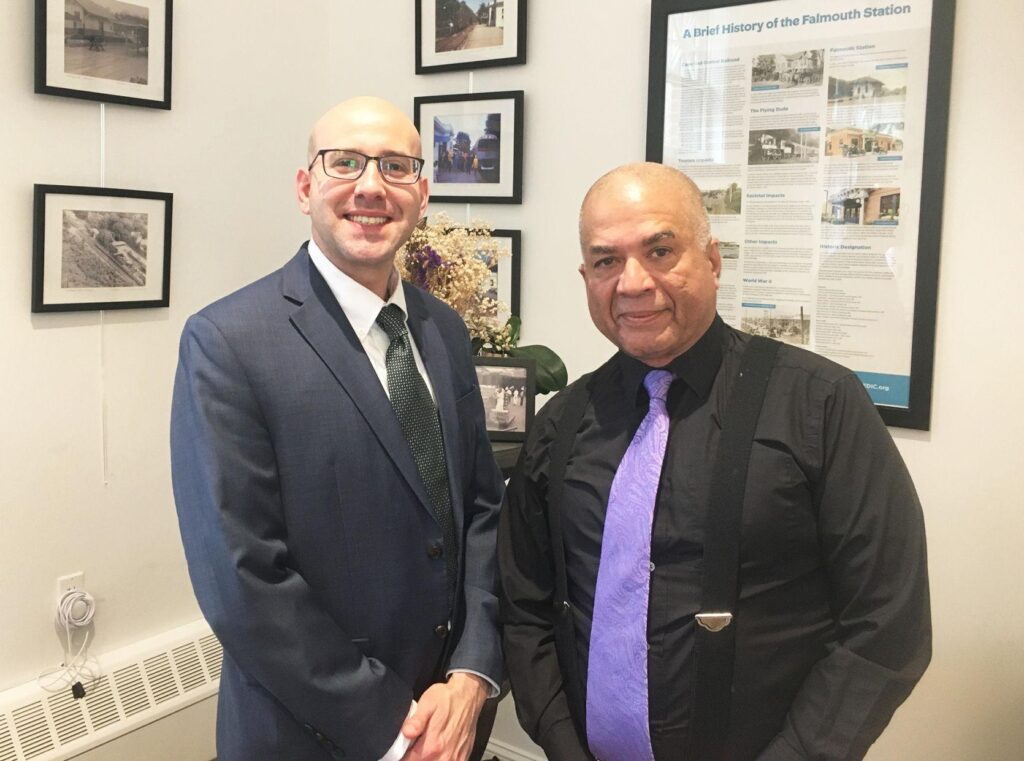Upper Cape residents are one step closer to having recreational marijuana available for delivery to their homes, and they have a familiar face to thank for it.
John P. Marcellino, a member of the Mashpee Wampanoag Tribe and co-owner of The Station Grill in downtown Falmouth, is also a co-owner of Tradesman Exchange, a cannabis delivery company that received a provisional license from the Massachusetts Cannabis Control Commission earlier this month.
Mr. Marcellino and Nicholas A. Gomes, an attorney on the Tradesman Exchange team, recently sat down with the Enterprise to discuss the new business, which also includes co-owners Leona Leaver and Jeffrey Pepi. Mr. Pepi is the chief executive officer of Growing in Health, a cannabidiol, or CBD, dispensary in Mashpee Commons.
The provisional license the company received allows it to move forward in the application process, Mr. Gomes said. The next step is architectural review by the state, after which physical build-out can begin.
Tradesman Exchange will be headquartered in Mashpee but will deliver to various towns in the region. Mr. Gomes said the company will be unable to deliver to certain areas, including schools and any communities that have prohibited marijuana.
The pair said it is their understanding this is the first cannabis delivery service on the Cape.
“I really believe that what’s going to make a big difference about this company is going to be the customer service,” Mr. Marcellino said.
His wife, Marion D. Marcellino, will continue to work at The Station Grill, he said, but he will work “constantly” at Tradesman Exchange to “make this the most special delivery operation in the country.”
“Same thing I did here. Everybody knows about the magic of The Station Grill, right?” he said. “And I intend on doing the same thing with this unique delivery company.”
The team plans to hire locally. A variety of positions, including drivers and office workers, will be needed.
“I would like to get as many Wampanoag tribal members involved in this business as possible,” Mr. Marcellino said, “because I think this is a great opportunity, and I think there are some tribal members that would be a perfect fit for this type of operation.”
Mr. Marcellino expressed appreciation for the Mashpee Select Board for their assistance in the process.
“The percentages are incredibly low of people of color involved in this [industry],” he said, noting that members of the board were “very interested” in seeing the business happen.
“That’s called inclusiveness. That’s called welcoming people of color to this industry, and I think they need to be recognized for that,” he said.
Mr. Gomes said they will have the ability to get products from cannabis retailers across the state. Cultivators could sell wholesale products to Tradesman Exchange, he said, and the products could then be white-labeled with brands. Mr. Marcellino has specific hopes to create a line of products called Tribal Fire, with what he called a “tribal flair.”
He is always trying to promote the Wampanoag people, he said, and wants to include the Wampanoag spirit in the company. In an email, Mr. Marcellino said he is likely the only Native American owner of a cannabis company in the state.
Over the past six months, 50 people have approached Mr. Marcellino wanting to know when he will be open, he said during the interview.
“There’s an untapped market, and we’re going to own that market,” he said.
The company will still need to go through a final state licensing process before it can service its first customer, Mr. Gomes said. He hopes the business will be up and running within a year.
Mr. Marcellino said he wants to satisfy and bring revenue to the town.
“But we also want to strongly build awareness for people of color, minorities, to try and get involved in this industry,” he said. “Don’t miss out on any opportunities. Get out there and try and get involved. Because I’m proof that you can do it, too.”
“That’s what this is about,” he added. “It’s not all about the money with me. It’s about getting minorities to be successful on Cape Cod, because it’s much too rare.”
H/T: www.capenews.net



